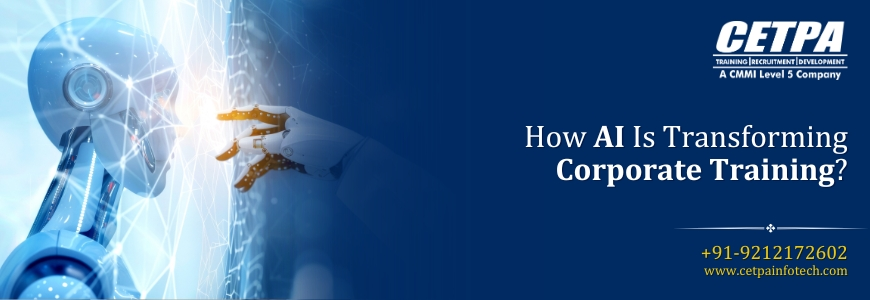Are you still attending outdated training sessions that feel irrelevant? Is your career growth being held back because your skills aren’t keeping pace with industry trends? Are you struggling to retain what you learn in corporate workshops? Are you not seeing results from your L&D investments? AI in corporate training can create a continuous and adaptive learning experience for professionals. AI can accelerate skill development like never before.
Why is AI Changing the Way We Learn at Work?
AI is a practical solution to the long-standing limitations of corporate training. Traditional L&D methods often followed a rigid structure, leading to low engagement and limited retention. Today, companies are turning to AI to fix these gaps by offering personalized and data-driven learning solutions.
In 2025, with the global L&D market surpassing $350 billion, the shift toward AI-powered learning systems is more than a trend. As business environments evolve quickly, so does the demand for skillsets that can keep up. And AI is helping organizations stay ahead.
Hyper-Personalized Learning Experiences
One of the most remarkable advantages AI brings to the table is hyper-personalization. Traditional methods push generic training modules. Whereas, AI algorithms assess each employee’s unique goals, skill levels, and learning styles to create tailored learning maps.
Imagine a marketing analyst and a finance associate attending the same course. AI ensures each of them gets relevant content and tasks, aligned with their job functions and growth paths. Adaptive learning platforms also monitor real-time performance and adjust difficulty levels, content types, or pacing accordingly. The result? Higher engagement, faster learning, and better outcomes.
AI Teaching Assistants are the Future of Virtual Classrooms
AI teaching assistants are revolutionizing instructor-led and self-paced online training. These digital assistants offer real-time support and can also clarify complex concepts. It provides customized feedback based on the behavior of the learner.
AI in corporate training means fewer challenges and better learner satisfaction for organizations running large-scale training programs. It also frees up human trainers to focus on strategy and mentorship, rather than routine instruction.
Scalable and Cost-Efficient for Training Companies
Training companies are also reaping the benefits of AI integration. AI enables providers to scale content delivery without compromising on quality. It helps create dynamic course structures that evolve based on learner feedback and business needs.
Moreover, AI reduces the time and cost involved in course creation and administration. It makes training programs more cost-effective while maximizing ROI. With AI-powered analytics, providers can also prove the impact of their training programs with hard data, helping them retain and attract enterprise clients.
Smart Learning Analytics for Better Business Outcomes
AI extends to deep learning analytics that track progress and predict outcomes. It can also refine training strategies. L&D teams can now monitor which modules are effective. AI also helps them identify drop-off points and understand learning behaviors in detail.
These insights make training measurable and strategic. It aligns workforce development with broader business objectives like improved productivity, employee retention, and customer satisfaction.
Conclusion
In a world where job roles evolve rapidly and skill gaps grow wider by the day, AI in corporate training has become crucial for everyone. AI is unlocking training strategies that are more aligned, more effective, and more human-centric. Organizations that embrace this shift will not only stay competitive but will foster a learning culture that thrives on innovation and growth.




